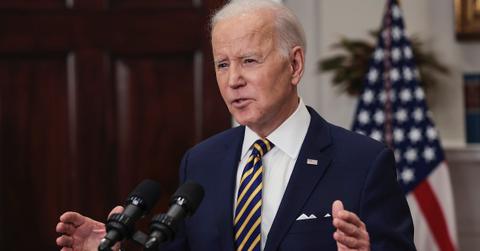Will Renewable Energy Take Over With Russian Oil Ban? What We Know
Published March 8 2022, 12:12 p.m. ET

At the end February 2022 when Russia first invaded Ukraine, we reported on how the military and political conflict can impact the environment and society, in general. In addition to consuming energy and emitting large amounts of greenhouse gases, warfare can create serious public health issues, and it even contributes to other seemingly unrelated problems. Right now, gas prices are the highest they've been in 7 years, and the Biden Administration has announced a ban on Russian oil imports to the U.S.
Some are taking this as an opportunity to make for a greener future — such as Connecticut Sen. Chris Murphy (D).
"If prices go up, then you are naturally through the market mechanisms going to have more U.S. production. Joe Manchin represents a coal state," Murphy stated as per The Hill, referring to fellow democratic senator of West Virginia, Joe Manchin, who suggested an increase in domestic oil and gas production.
"I represent a state that's going to have a lot of wind power online very soon and so my preference would be to try to fill in that gap with renewable energy," Murphy continued. "I would just want to make sure that in the United States, if we're gonna have to fill in what we lose in Russian gas, that's not just from West Virginia coal. That's also from Long Island Sound wind power."
Watch the full video of Biden's announcement, below.
What to know about the U.S.' ban on oil imports from Russia:
On Tuesday, March 8, Biden confirmed the decision to ban Russian oil imports to the U.S. This decision was made independently from other European states, which are heavily reliant on Russian energy. In the U.S., though, Russian energy only made up 8 percent of the U.S.' energy in 2021. The Biden Administration is now looking into other oil import options in South America and the Middle East.
Per a press release from Alaska Sen. Dan Sullivan (R), this would defund Putin's war efforts
“When America buys Russian oil, we fund Vladimir Putin’s war of aggression against Ukraine and his threats against the U.S. and our NATO partners,” Sullivan explained. “Simply put, continuing to import oil from Russia is national security suicide. We never should have been in this position."
However, like Manchin, he'd prefer to drill domestically.
"The first step to regaining energy independence is ending the flow of Russian oil — the lifeblood of Putin’s corrupt regime — to our own country."
And, as the U.S. ultimately proceeds with this, it could put other countries in a bad position. Per CNBC, Russia is threatening to raise gas barrel prices for other countries such as Germany, the Netherlands, and the U.K.
“It is absolutely clear that a rejection of Russian oil would lead to catastrophic consequences for the global market,” Russian Deputy Prime Minister Alexander Novak stated. “The surge in prices would be unpredictable. It would be $300 per barrel if not more.”
But some think it could be the push we need to transition to more renewable energy.
According to Reuters, some think this ban could be enough to boost the transition to clean, renewable energy resources, such as electric and solar.
"We should take the subsidies we now devote to natural gas, coal, and petroleum and put them into renewable energy generation, electric mobility and EV charging infrastructure, heat pumps, building efficiency upgrades," Professor Wolfgang Ketter of Erasmus University in the Netherlands stated, as per Reuters.
"Anything that will lead to long term energy security by reducing fossil fuel dependency," he continued
With the Biden administration's ban, hopefully stronger efforts are made to push for renewable energy, instead of solely turning to crude oil sources elsewhere. But only time will tell.
Green Matters’ new book, Green Living, is the perfect guide to living an eco-friendly lifestyle for people at every stage of the process. You can order Green Living here.